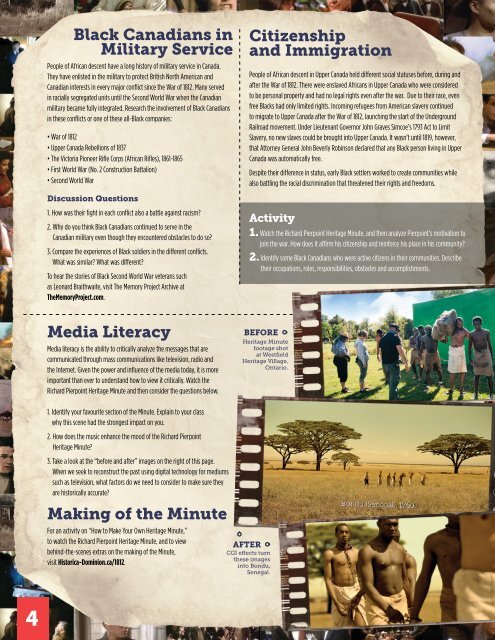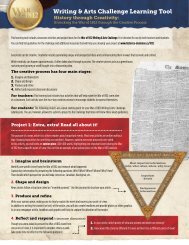Richard Pierpoint - Historica
Richard Pierpoint - Historica
Richard Pierpoint - Historica
You also want an ePaper? Increase the reach of your titles
YUMPU automatically turns print PDFs into web optimized ePapers that Google loves.
Black Canadians in<br />
Military Service<br />
People of African descent have a long history of military service in Canada.<br />
They have enlisted in the military to protect British North American and<br />
Canadian interests in every major conflict since the War of 1812. Many served<br />
in racially segregated units until the Second World War when the Canadian<br />
military became fully integrated. Research the involvement of Black Canadians<br />
in these conflicts or one of these all-Black companies:<br />
• War of 1812<br />
• Upper Canada Rebellions of 1837<br />
• The Victoria Pioneer Rifle Corps (African Rifles), 1861-1865<br />
• First World War (No. 2 Construction Battalion)<br />
• Second World War<br />
Discussion Questions<br />
1. How was their fight in each conflict also a battle against racism?<br />
2. Why do you think Black Canadians continued to serve in the<br />
Canadian military even though they encountered obstacles to do so?<br />
3. Compare the experiences of Black soldiers in the different conflicts.<br />
What was similar? What was different?<br />
To hear the stories of Black Second World War veterans such<br />
as Leonard Braithwaite, visit The Memory Project Archive at<br />
TheMemoryProject.com.<br />
Media Literacy<br />
Media literacy is the ability to critically analyze the messages that are<br />
communicated through mass communications like television, radio and<br />
the Internet. Given the power and influence of the media today, it is more<br />
important than ever to understand how to view it critically. Watch the<br />
<strong>Richard</strong> <strong>Pierpoint</strong> Heritage Minute and then consider the questions below.<br />
Citizenship<br />
and Immigration<br />
People of African descent in Upper Canada held different social statuses before, during and<br />
after the War of 1812. There were enslaved Africans in Upper Canada who were considered<br />
to be personal property and had no legal rights even after the war. Due to their race, even<br />
free Blacks had only limited rights. Incoming refugees from American slavery continued<br />
to migrate to Upper Canada after the War of 1812, launching the start of the Underground<br />
Railroad movement. Under Lieutenant Governor John Graves Simcoe’s 1793 Act to Limit<br />
Slavery, no new slaves could be brought into Upper Canada. It wasn’t until 1819, however,<br />
that Attorney General John Beverly Robinson declared that any Black person living in Upper<br />
Canada was automatically free.<br />
Despite their difference in status, early Black settlers worked to create communities while<br />
also battling the racial discrimination that threatened their rights and freedoms.<br />
Activity<br />
1. Watch the <strong>Richard</strong> <strong>Pierpoint</strong> Heritage Minute, and then analyze <strong>Pierpoint</strong>’s motivation to<br />
join the war. How does it affirm his citizenship and reinforce his place in his community?<br />
2. Identify some Black Canadians who were active citizens in their communities. Describe<br />
their occupations, roles, responsibilities, obstacles and accomplishments.<br />
BEFORE<br />
Heritage Minute<br />
footage shot<br />
at Westfield<br />
Heritage Village,<br />
Ontario.<br />
1. Identify your favourite section of the Minute. Explain to your class<br />
why this scene had the strongest impact on you.<br />
2. How does the music enhance the mood of the <strong>Richard</strong> <strong>Pierpoint</strong><br />
Heritage Minute?<br />
3. Take a look at the “before and after” images on the right of this page.<br />
When we seek to reconstruct the past using digital technology for mediums<br />
such as television, what factors do we need to consider to make sure they<br />
are historically accurate?<br />
Making of the Minute<br />
For an activity on “How to Make Your Own Heritage Minute,”<br />
to watch the <strong>Richard</strong> <strong>Pierpoint</strong> Heritage Minute, and to view<br />
behind-the-scenes extras on the making of the Minute,<br />
visit <strong>Historica</strong>-Dominion.ca/1812.<br />
AFTER<br />
CGI effects turn<br />
these images<br />
into Bondu,<br />
Senegal.<br />
4




